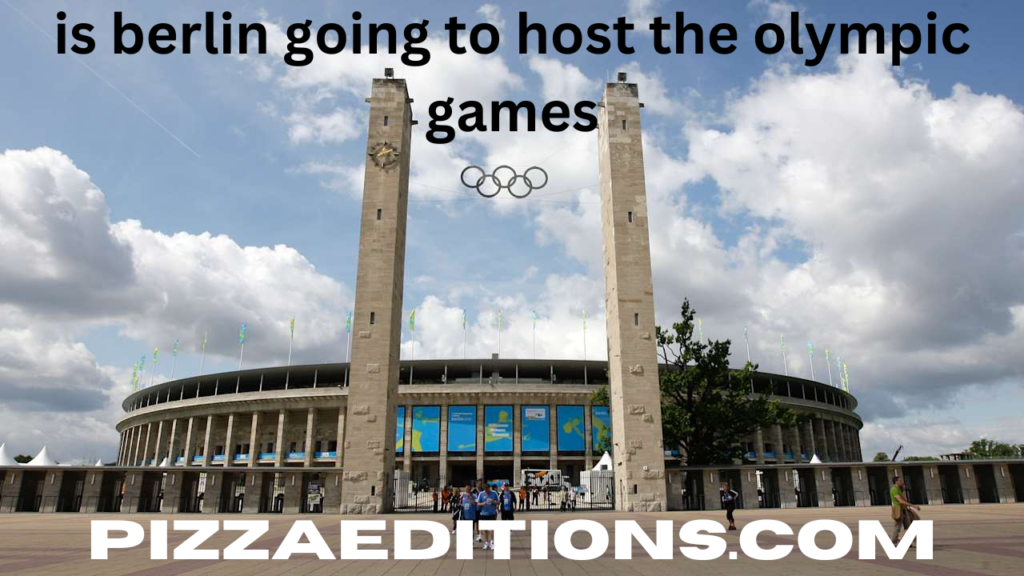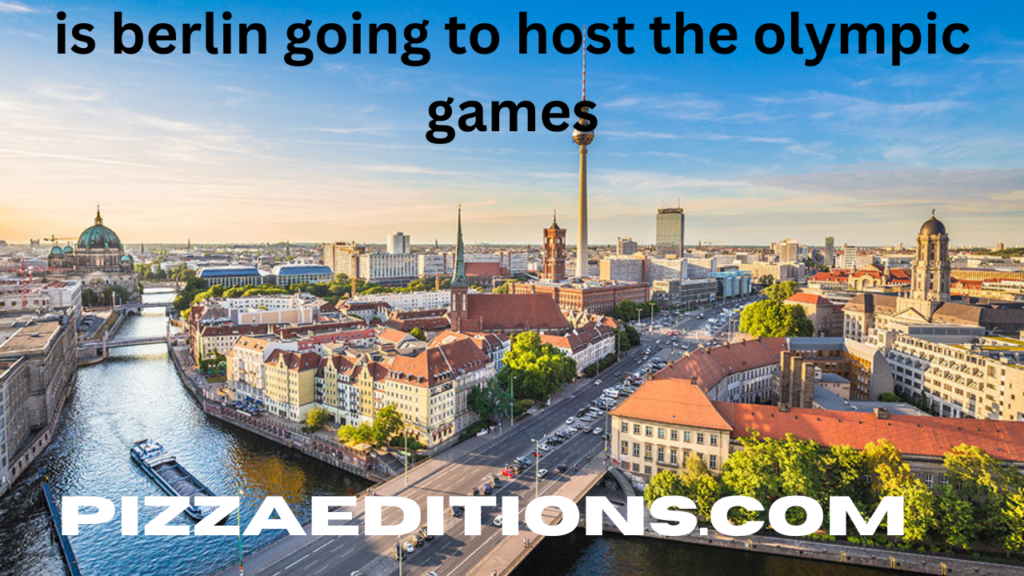Many sports fans and city planners are wondering if Berlin, Germany’s energetic capital, would host the Olympic Games anytime soon as the world of international sports anxiously awaits the next sporting event. This query has generated discussions, aspirations, and an inquiry regarding Berlin’s chances of winning the coveted title of host city for the Olympics. This article will look at Berlin’s possibilities of hosting the Olympic Games, analyze the variables that affect the choice, and discuss the potential effects of hosting such a significant event on the city and its citizens.
The Road to Hosting the Olympic Games: A Brief Overview

The International Olympic Committee (IOC) is responsible for awarding the Olympic Games to cities throughout the globe. The bidding process is intensive and demands extensive planning, commitment, and a clear vision for the future. A city that desires to host the Olympic Games must first submit a bid, which is assessed and approved by the IOC’s numerous committees. These proposals are considered based on characteristics like as infrastructure, economic potential, sustainability, social effect, and the capacity to accommodate a significant number of visitors and athletes.
Historically, hosting the Olympics has been a tremendous honor for communities across the world. Cities such as London, Tokyo, and Rio de Janeiro have all won the privilege to host the Games, and each event has left a lasting influence on the host cities’ economies, infrastructures, and worldwide profiles. The topic of whether Berlin will be the next city to join this elite list is surely fascinating.
Berlin’s Previous Olympic Bid: A Look Back

Berlin has a rich history of involvement with the Olympic Games. The city hosted the Summer Olympics in 1936, under the regime of Adolf Hitler, a controversial event that is remembered for its political overtones and the rise of Nazi propaganda. The Games, however, were also marked by the triumph of African-American athlete Jesse Owens, who won four gold medals in defiance of the racist ideology espoused by the Nazi regime.
Since then, Berlin has made many attempts to bring the Olympic Games back to the city. The most recent bid was for the 2024 Summer Olympics, but Berlin lost out to Paris, who was granted the Games. This failure did not discourage Berlin’s ambition to host the Games, and municipal leaders and Olympic fans have continued to campaign for the city’s potential as a future host.
Berlin’s involvement in the Olympic bidding process is noteworthy because it shows the city’s commitment to international sports and its desire to showcase its modern identity as a progressive, cosmopolitan city. With its excellent infrastructure, rich cultural heritage, and thriving economy, Berlin remains an attractive candidate for the Olympic Games in the future.
Berlin’s Infrastructure and Readiness for the Olympics

A significant component in assessing whether Berlin will host the Olympic Games in the foreseeable future is its current infrastructure. The city boasts a well-developed transportation network, including a major public transit system, an international airport, and modern roads, all of which would be important for handling the surge of tourists during the Games. Berlin is also home to a vast array of sporting facilities, including the renowned Olympiastadion (Olympic Stadium), which hosted the 1936 Olympics and is currently used for football and other sports events.
In addition to these existing amenities, Berlin has continued to invest in its infrastructure in recent years. Major reconstruction initiatives have reshaped the city, including the creation of new sports complexes, hotels, and conference centers. The city’s capacity to accommodate huge numbers of athletes, officials, and spectators is one of its biggest selling features.
Moreover, Berlin has a reputation for being a city that prioritizes sustainability. Many cities bidding for the Olympic Games are focusing on reducing their environmental impact, and Berlin has positioned itself as a leader in this area. The city’s commitment to green building practices, renewable energy, and waste reduction would align well with the Olympic Movement’s growing emphasis on sustainability and environmental stewardship.
The Economic Impact of Hosting the Olympic Games
The economic benefits of hosting the Olympic Games are often cited as one of the key motivations for cities bidding for the event. For Berlin, the potential economic impact would be significant. Hosting the Olympics would bring millions of visitors to the city, including tourists, media representatives, sponsors, and athletes, all of whom would contribute to the local economy through spending on hotels, restaurants, and entertainment.
Moreover, the Games would provide a substantial boost to the city’s job market, as thousands of temporary jobs would be created in fields ranging from construction and security to event management and hospitality. In the long term, the infrastructure improvements made in preparation for the Games, such as upgraded transportation systems and new sports facilities, would benefit the city for years to come.
However, it’s important to note that hosting the Olympics is not without its financial risks. The cost of organizing the Games can be astronomical, and not all host cities have seen the expected economic returns. While some cities, such as London and Barcelona, have profited from hosting the Olympics, others, like Athens and Rio de Janeiro, have faced significant economic challenges. Berlin would need to carefully weigh the potential economic benefits against the costs and risks involved in hosting such a massive event.
Political and Social Considerations
Hosting the Olympic Games is not just an economic or logistical challenge; it is also a political and social one. Cities bidding for the Games must consider the impact on local residents, the potential for social unrest, and the need for political stability. In recent years, there has been growing resistance to the idea of hosting the Olympics in certain cities, with some citizens expressing concerns about the displacement of local communities, the cost of the Games, and the disruption to daily life.
In Berlin, there has been some opposition to the idea of hosting the Olympic Games, particularly from those who believe that the funds required to organize the event could be better spent on addressing pressing social issues such as housing, healthcare, and education. Others are concerned about the environmental impact of building new infrastructure and the potential for gentrification in certain neighborhoods.
However, Berlin’s city officials have made efforts to address these concerns by emphasizing the potential for the Games to be a catalyst for positive change. They argue that the Olympics could serve as a platform for promoting social inclusion, sustainability, and international cooperation. The city’s commitment to transparency and public consultation during the planning process would be essential to gaining the support of its residents and ensuring that the Games leave a positive legacy.
The Role of Germany in the International Olympic Movement
Germany is a key player in the international sports community, and its support for Berlin’s bid to host the Olympic Games would be crucial. The German Olympic Sports Confederation (DOSB) has been actively involved in promoting Berlin’s candidacy, and the country’s strong track record in hosting successful international sporting events, such as the 2006 FIFA World Cup and the 2019 IAAF World Athletics Championships, would lend credibility to the city’s bid.
Berlin’s cultural and political significance also makes it an appealing choice for the IOC. As the capital of Germany, Berlin is a symbol of unity, progress, and international cooperation, making it a fitting host city for the Olympic Games. The city’s global profile, combined with its rich history and modern amenities, would make it an attractive destination for athletes, spectators, and sponsors alike.
Conclusion: Will Berlin Host the Olympic Games?
The question of whether Berlin will host the Olympic Games in the future remains uncertain, but the city is undoubtedly a strong contender. Its excellent infrastructure, commitment to sustainability, and rich cultural heritage make it an appealing choice for the IOC. However, the decision to award the Games will depend on a variety of factors, including the city’s ability to secure political and social support, the economic feasibility of hosting the event, and the level of competition from other cities bidding for the Games.
While Berlin may not be hosting the Olympics in the near future, the city’s continued ambition and commitment to international sports suggest that it could be a serious contender in future Olympic bidding cycles. If Berlin does eventually secure the honor of hosting the Olympic Games, it will be a momentous occasion that could leave a lasting legacy for the city and the world of sports.
Also Read: Memphis Grizzlies vs New Orleans Pelicans Stats: A Comprehensive Analysis
